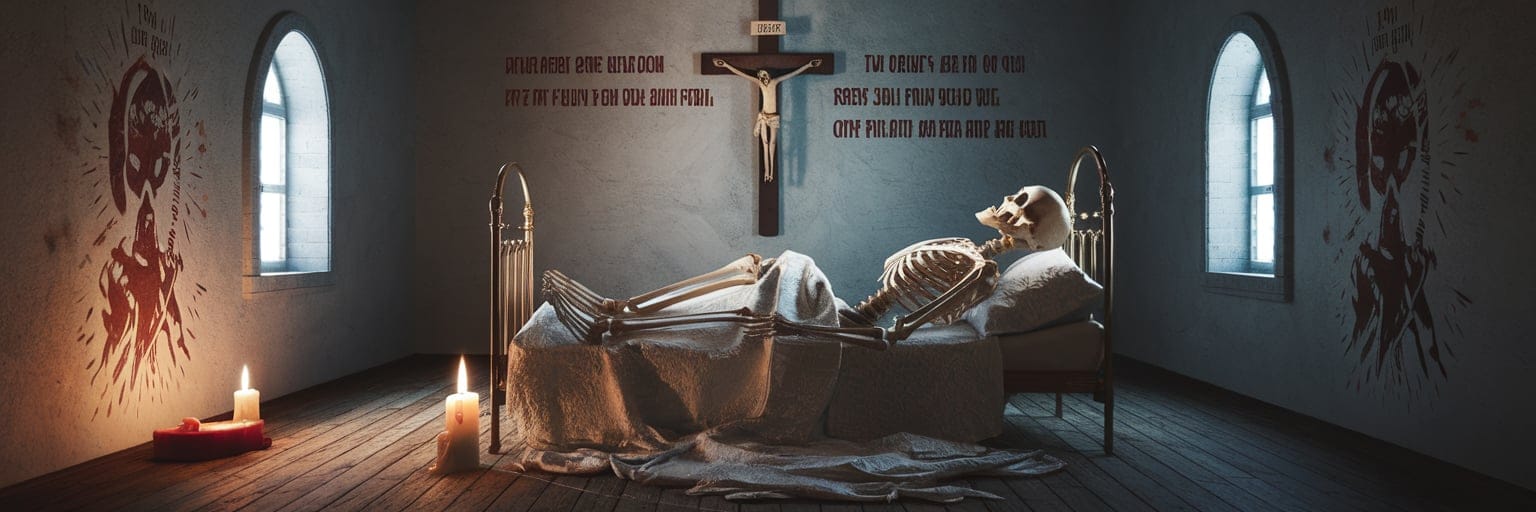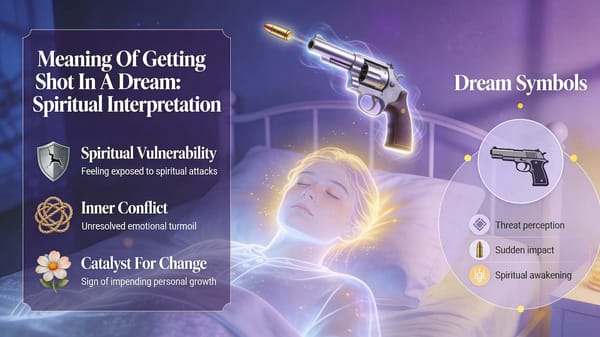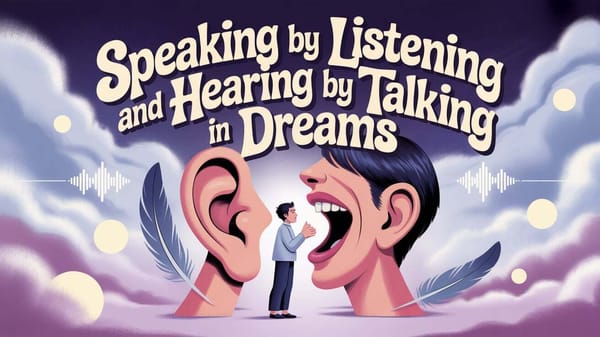I Had a Dream My Mom Died What Does That Mean in Christianity?

Dreams often transport us into realms where the surreal blurs with reality, leaving us with emotions that linger long after we wake. Among these nocturnal narratives, dreams where we see a beloved parent die stand out for their unnerving intensity. These dreams can evoke profound emotions, from fear and loss to reflections on our deepest insecurities. Across cultures and time, such dreams have been woven with significance, serving as windows into our subconscious. For those of Christian faith, dreams carry spiritual weight, prompting a search for deeper meaning. What messages might these dreams harbor within the framework of Christianity?
What Do They Really Mean? Let’s Explore the Symbolic, Psychological, and Scientific Interpretations of This Intriguing Dream.
The Symbolic and Spiritual Significance of Seeing a Parent Die
In Christianity, the symbolism of a parent's death in a dream may not portend literal death but often represents a pivotal shift or transformation in the dreamer's life. The demise of a parent figure may symbolize the end of an era or a significant change. It captures the essence of transition—a call to leave behind what once provided comfort and guidance and embrace newfound independence. Spiritually, such dreams might urge the dreamer to seek solace in faith, relying on divine support as new life phases unfold.

Christian teachings often highlight themes of life, death, and rebirth through Christ's resurrection. This dream may mirror those themes, symbolizing transformation and spiritual renewal. Dreams are a call to deepen one's faith, encouraging trust in divine wisdom and guidance during times of change.
What Do Different Scenarios of Seeing a Parent Die Mean?
Gradual Death: If the dream portrays a slow or peaceful passing, it might suggest that the dreamer is going through a gradual transformation, either relationally, emotionally, or spiritually. This aligns with a gentle awakening or a steady dismantling of past habits or beliefs.
Sudden Death: A sudden death scenario might reflect abrupt changes or unforeseen challenges emerging in the dreamer's life. It symbolizes a significant shift that demands immediate adaptation, perhaps unresolved feelings towards the parent or situations requiring prompt resolution.
Emotional Reactions: Fear or pain experienced during the dream can be indicative of subconscious fears—perhaps of loss, abandonment, or inadequacy. On the other hand, a sense of acceptance or peace might highlight the dreamer's readiness to embrace change or to find closure in strained relationships.
Psychological Interpretations of Seeing a Parent Die
From a Freudian perspective, dreaming of a parent's death can reflect repressed emotions or conflicts with the parental figure. Freud might suggest this dream illustrates underlying feelings of guilt or suppressed desires for independence. It uncovers hidden emotions seeking reconciliation.
Jungian interpretation presents this dream as a shadow aspect—a part of the self that remains unacknowledged. The parent might embody aspects of the dreamer's personality they wish to sever or transform. Engel’s ideas also invite us to explore the spiritual or maternal energy, indicating a need to balance male and female principles within oneself.

Reiki perspectives might consider energy imbalances manifesting in the dream. The emotional turmoil associated with witnessing a parent die may signify blockages that need clearing, urging the dreamer to pursue healing and emotional harmony.
Common Causes and Factors Behind Seeing a Parent Die
Several factors can trigger these dreams, including stress, significant life changes, or health anxieties. The loss or transformation of roles and relationships—whether anticipated or occurring—often serves as a background theme. Resentment or unresolved conflicts may also contribute, reflecting the turmoil in dream scenarios.
Scientific Explanations for Seeing a Parent Die in Dreams
Scientifically, dreams are influenced by neurological and physiological factors. The brain's processing of daily experiences, sensory input, and emotional states can evoke vivid dream imagery. Sleep disturbances or disruptions might heighten these experiences, embedding them into the dream narrative. Neurological theories suggest dreams provide a mechanism for emotional processing, aiding mental restoration and adaptation.

Coping Strategies for Seeing a Parent Die in Dreams
Understanding these dreams begins with introspection. Keeping a dream journal can be a valuable tool, helping to track recurring themes or emotions. Engaging in prayer, meditation, or counseling can provide spiritual and emotional support, allowing one to work through unresolved feelings. Additionally, adopting habits that enhance sleep quality—such as establishing a calm bedtime routine or reducing stress—can mitigate disturbing dreams.
Summary & Final Thoughts
Dreams of seeing a parent die stand as powerful reflections of our inner world and spiritual journey. As you examine the roles and relationships in your waking life, these dreams might illuminate aspects needing attention or transformation. Ponder these dreams with curiosity and compassion, mindful of the deeper meanings they may impart. Embrace them as opportunities for growth and renewal, trusting that each offers valuable insights guiding you through life's intricate tapestry.
Check our dream interpret if you wonder seeing your child dies in a dream.
FAQ: Interpreting Dreams of a Parent's Death in Christianity
What is the spiritual meaning of dreaming about a parent's death in Christianity?
In a Christian context, dreaming about a parent's death often symbolizes significant life changes or spiritual transitions rather than predicting a literal death. It might suggest a period of personal transformation, highlighting the need for independence and divine guidance.
Does a dream about a parent's death indicate actual death?
Not necessarily. Dreams about a parent's death often reflect emotional transitions or significant changes in life, rather than foretelling an actual death.
What are the different scenarios of a parent's death in a dream, and what do they signify?
- Gradual Death: Symbolizes a gentle and ongoing transformation, indicating the discarding of old habits or beliefs.
- Sudden Death: Highlights abrupt changes, sudden challenges, or unexpected life shifts.
- Emotional Reactions: Fear or distress could reflect subconscious fears or insecurities. Conversely, peace or acceptance might suggest readiness to embrace change or resolve issues.
How do psychological theories explain dreams of a parent's death?
- Freudian View: Might interpret these dreams as expressions of repressed emotions or unresolved conflicts with the parents.
- Jungian Perspective: May see the parent in the dream as a shadow or unacknowledged aspect of the dreamer, reflecting personal traits or attitudes needing attention.
- Reiki Approach: Might consider such dreams as signals of energy blockages, indicating a need for energy alignment or emotional healing.
What factors commonly trigger dreams about a parent's death?
Factors include stress, major life transitions, health anxieties, relationship changes, and unresolved conflicts. Dreams of this nature may surface as the subconscious mind attempts to process these feelings.
How does science explain dreams about a parent's death?
Scientific explanations suggest dreams of a parent's death could result from brain activity during REM sleep, potentially influenced by daily experiences and emotional processing. Sleep disturbances can also influence the vividness of dreams.
What coping strategies can help with dreams of a parent's death?
Coping strategies can include keeping a dream journal to track themes and patterns, seeking professional guidance or spiritual support to manage emotional reactions, implementing calming pre-sleep routines, and managing stress levels to enhance sleep quality.
What overall message do dreams of a parent's death convey?
These dreams often reflect the dreamer's journey toward self-discovery and personal transformation. They invite introspection on life shifts, emotional issues, and spiritual growth. Reflecting on these dreams can foster deeper understanding and lead to emotional healing.




